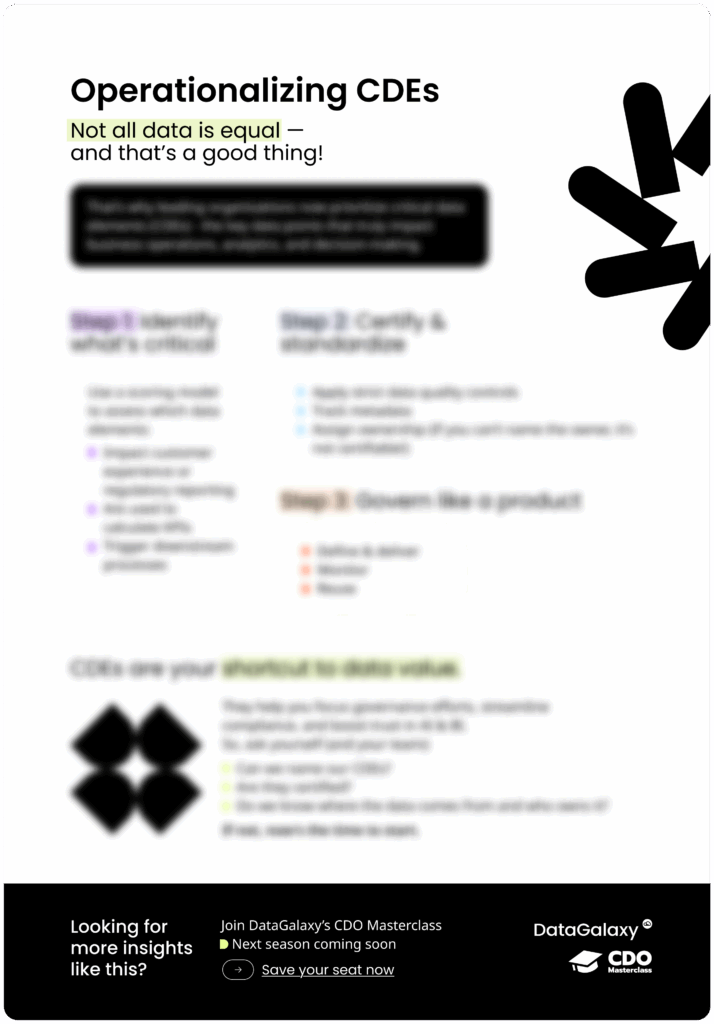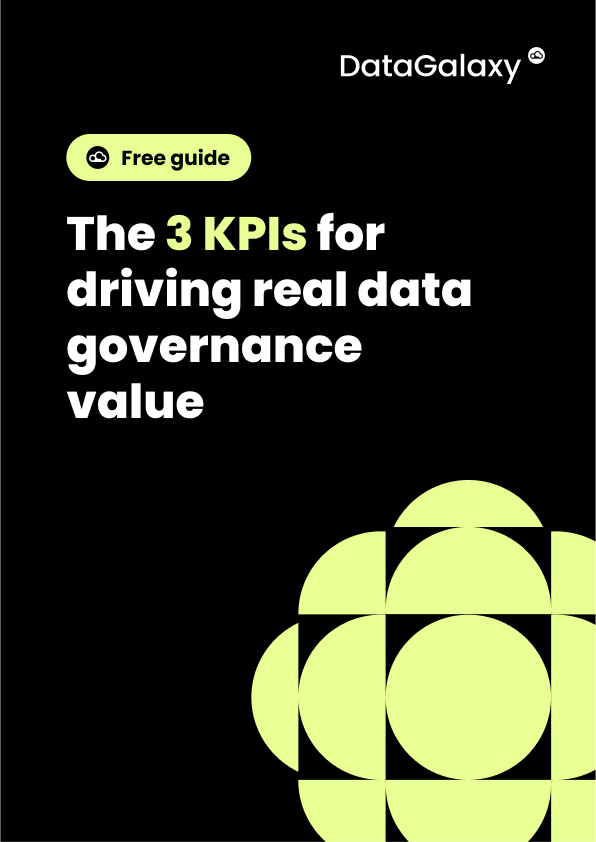
Understanding the importance of data governance for businesses, from data quality to business efficiency
Data is everywhere, but for all its potential, data is only as useful as it is trustworthy, organized, and secure.
That’s where data governance comes in. It’s not just a checklist or IT function—it’s the foundation for making sure your data is accurate, accessible, and actually helps your business move forward.
Whether you’re trying to improve decision-making, stay on top of regulations, or simply get everyone on the same page, data governance is what makes it all possible.
TL;DR (Summary)
Data governance ensures your data is accurate, secure, and usable—so your business can trust it and act on it. It defines who owns data, who can use it, and how it should be managed.
Strong governance improves data quality, enables regulatory compliance, strengthens security, supports AI, boosts efficiency, and reduces risk.
Most importantly, it creates the foundation for a truly data-driven culture. In a world where data fuels every decision, governance isn’t optional—it’s essential for long-term success.
In this article, we’ll break down what data governance really means, why it matters, and how it can help your business turn data into real value.
What is data governance?
Data governance is the process of managing the availability, usability, integrity, and security of the data in enterprise systems.
Simply put, data governance is an organizational framework that sets out how businesses manage, maintain, and utilize their data.
It focuses on data quality, consistency, and accessibility, aiming to ensure that every piece of information is trustworthy and valuable.
With the volume of business data growing exponentially each day, the importance of data governance has become increasingly more pronounced. It is the backbone of efficient decision-making, helping companies transform raw data into actionable insights.
Why is data governance important?
Simply put, data governance is the framework that keeps your data trustworthy, secure, and ready for whatever comes next.
It helps answer critical questions: Who owns this data? Who can use it? And under what rules?
Good governance doesn’t just protect data—it activates it. Your teams can trust what they see, move faster, and make decisions that stand up to scrutiny.
Let’s drill down on the basics that breathe life into a governance framework.
The essential elements of data governance
Great governance relies on a few core components to bring order, context, and accountability to your data ecosystem.
Here’s what they are, what they do, and why they matter:
Data ownership
Assigning direct ownership to individual datasets creates lasting accountability for accuracy, freshness, and access. Data stewards support that ownership by maintaining quality, resolving problems, and upholding standards.
Without clear ownership, accountability fades, and trust goes with it.
Policies
Policies define the rules of engagement. They cover everything from data classification and retention to acceptable use and access control.
Strong policies shape behavior. When written clearly, they make it easier for everyone to handle data responsibly.
Data quality
Governance without quality is an empty promise. Clear standards for accuracy, completeness, and consistency ensure that insights are sound and decisions are defensible.
With monitoring and validation built in, you can catch problems before they spread downstream.
Access control
Role-based permissions, approval workflows, and audit trails protect sensitive information while keeping teams productive.
The right people. The right data. At the right time. That’s the goal.
Metadata management
Metadata transforms raw data into something usable. It tells you where the data came from, what it means, and how it flows through your ecosystem. Metadata offers vital context that powers data discovery, compliance, and AI transparency.
So why is data governance important, and why do these components matter so much right now? Let’s talk about it.
Operationalizing
CDEs
Do you know how to make critical data elements (CDEs) work for your teams?
Get your go-to guide to identifying and governing critical
data elements to accelerate data value.

Why does data governance matter so much?
Data governance powers every high-stakes initiative your teams touch. This can include Scaling operations, deploying AI, and managing compliance.
Without it? Friction, guesswork, and unnecessary risk.
Data governance builds trust
When everyone, from engineers to executives, knows where data comes from, how it’s managed, and what it means, confidence is built into every outcome.
Governance eliminates ambiguity and turns hesitation into action.
Data governance lowers risk
From GDPR to HIPAA, the rules are only getting stricter. Governance gives you visibility into sensitive data, audit traceability, and safeguards to prevent slip-ups.
It’s your best defense against regulatory pain and reputational fallout.
Data governance improves data quality
Quality doesn’t happen by accident.
Data governance sets standards, assigns accountability via ownership, and monitors processes to keep data clean, complete, and ready for use.
No more crossed fingers and guesswork.
Data governance improves efficiency
Shared definitions. Clear responsibilities. Strong lineage.
Governance eliminates time spent hunting for data, fixing errors, or second-guessing its accuracy.
People spend less time troubleshooting and more time delivering results.
Data governance powers AI
AI models need AI-ready data: reliable, high-quality, bias-free data.
Governance supplies the foundation for accurate, explainable, and ethical AI outputs.
As AI-backed decisions increasingly shape real-world outcomes, data governance is shifting from best practice to business imperative.
Data governance strengthens security
Governance enforces who can access what, when, and why.
It protects sensitive data with role-based controls and audit trails that prevent breaches before they happen.
Data governance: A strategic asset
Seeing data governance as a strategic asset is key to understanding its importance.
Data governance enables businesses to establish a single version of truth for their data, minimizing conflicts and confusion about data accuracy.
This cohesive approach fosters trust in the data, elevating its strategic value. Businesses can therefore leverage data more confidently in their strategic planning and decision-making processes.
With accurate and reliable data at their disposal, businesses can uncover valuable insights, predict trends, and make informed decisions that drive growth and competitive advantage.
How to enhance data quality with data governance
At the heart of data governance is a commitment to enhancing data quality.
A sound governance strategy ensures that the data employed in business operations and decision-making processes is clean, consistent, and accurate.
This involves establishing stringent data validation, cleansing, and enrichment protocols to maintain the integrity of the data.
High-quality data is a critical asset in the era of analytics and big data, where every piece of information can be analyzed for insights and trends.
Without proper data governance, data can become fragmented, outdated, or erroneous, leading to skewed insights and potentially costly mistakes.
Designing data & AI products that deliver business value
To truly derive value from AI, it’s not enough to just have the technology.
- Clear strategy
- Reasonable rules for managing data
- Focus on building useful data products

Therefore, one key reason for understanding the importance of data governance is understanding data quality and integrity, which paves the way for insightful and effective business strategies.
Ensuring regulatory compliance with good data governance
Data governance is crucial for organizations looking to stay ahead in the ever-evolving regulatory landscape.
It assists businesses by maintaining compliance with a range of regulations, not only those specific to their industry (such as HIPAA for healthcare or GDPR for European businesses), but also broader data privacy and security regulations.
Effective data governance involves establishing policies and processes that align with regulatory standards, reducing the risk of costly fines and reputational damage linked to non-compliance.
It also promotes an understanding of regulatory changes, helping businesses to adapt and ensure ongoing compliance.
Understanding the importance of data governance extends beyond mere data management – It’s also about safeguarding the business against regulatory pitfalls and maintaining the trust of customers and stakeholders.
Promoting business efficiency with data governance
Effective data governance promotes efficiency in business operations.
By creating a unified view of a company’s data assets, data governance helps eliminate redundancy and inconsistency, streamline processes, and reduce costs.
This operational efficiency arises from consistent data definitions, clear data ownership, and established data handling processes, all of which are key aspects of data governance.
Businesses that fully understand the importance of data governance are better able to align their data strategy with their overall business objectives, resulting in more coherent, goal-oriented actions.
Moreover, by eliminating data silos and ensuring the easy availability of accurate data, data governance can reduce time spent searching for and validating data, freeing up resources for more value-added tasks.
Blink, your AI Copilot
Ask questions. Get answers. Drive action.
Blink helps every user explore, understand, and use data in their daily work. No tickets, no filters, no delays. Ask anything in your native language and get trusted, contextual answers and recommendations.
Meet Blink!Data privacy & security: Enhancement with data governance
Data privacy and security are central to the importance of data governance.
With rising concerns about data breaches and unauthorized data usage, ensuring data privacy and security has become paramount for businesses. This involves defining who can access specific data, how it can be used, and what levels of security are required to protect it.
Data governance policies and procedures provide clear guidelines to prevent unauthorized data access and misuse.
In addition, they ensure that the business meets legal and ethical standards for data protection. By ensuring data privacy and security, businesses not only prevent costly breaches and penalties but also build trust with their customers and stakeholders.
Risk management with data governance
Data governance plays a pivotal role in risk management.
By setting clear protocols and procedures for data handling, data governance can significantly mitigate the risk of data breaches and misuse.
Strong data governance ensures data traceability, crucial for swiftly identifying and rectifying any potential issues, thereby minimizing risk and fallout.
Additionally, it aids in regulatory compliance, another significant risk factor for businesses.
By keeping data in check and ensuring it meets all necessary standards and regulations, businesses can avoid hefty penalties and reputational damage associated with non-compliance.
Data governance’s importance extends into the realm of risk management, safeguarding businesses from potential data-related pitfalls.

The 3 KPIs for driving real data governance value
KPIs only matter if you track them.
Move from governance in theory to governance that delivers.
Download the free guideData governance for enabling data transparency
Data governance promotes transparency in business operations by defining and managing access to data. It establishes clear guidelines on who can access specific data, how it can be used, and under what conditions.
By ensuring data transparency, businesses can maintain control over their information assets, prevent unauthorized data access, and protect sensitive information.
This transparency not only enhances internal operations but also helps build trust with customers and stakeholders. It demonstrates a commitment to data privacy and security, fostering confidence that data is being handled responsibly.
Data transparency is increasingly important in today’s data-driven landscape, where individuals and regulatory bodies are demanding more transparency around data collection, usage, and privacy practices.
By embracing data governance, businesses can facilitate data integration, promote transparency, and address key risk management concerns. These aspects of data governance contribute to the overall success and resilience of a business in an increasingly data-centric world.
Fostering an organizational data-driven culture
Finally, effective data governance helps to foster a data-driven culture within an organization: It empowers employees at all levels to use data in their decision-making processes, promoting efficiency and innovation.
This culture shift towards data-driven decision-making can be a game-changer, giving businesses the edge in a competitive market.
DataGalaxy for seeing the benefits of modern data governance
Choosing the right platform is the difference between governance that slows teams down and governance that accelerates the entire business.
DataGalaxy stands apart because it delivers all the benefits of data governance—trust, quality, security, transparency, and efficiency—in a single, collaborative, business-friendly platform.
DataGalaxy isn’t just a tool. It’s the operating system for your data governance strategy.
DataGalaxy centralizes ownership and accountability
Many organizations struggle with unclear data ownership, scattered responsibilities, and inconsistent workflows.
DataGalaxy solves this by providing:
- Clear assignment of data owners, stewards, and contributors
- Built-in workflows that maintain accountability and ensure ongoing data quality
- A collaborative workspace where roles and responsibilities are always visible
This creates a single version of truth—no ambiguity, no guesswork.
Policies and standards come to life, not just on paper
Governance fails when policies are static or disconnected from daily work.
DataGalaxy embeds policies directly into your data environment, enabling teams to:
- Apply classification rules at scale
- Enforce retention, access, and usage policies automatically
- Standardize definitions through a centralized business glossary
Policies aren’t hidden. They’re actionable and visible.
Superior data quality through proactive control
Bad data is expensive, inefficient, and risky. DataGalaxy reinforces high-quality data by enabling:
- Monitoring and alerts for data inconsistencies
- Validation rules that catch issues before they impact the business
- Ownership-driven quality improvement workflows
Your teams move from “cleaning up data problems” to “preventing them.”
Secure, role-based access that protects critical data
DataGalaxy enhances data security by defining:
- Role-based access controls that ensure the right people see the right data
- Audit trails that document how data is used
- Automated safeguards for sensitive and regulated data
This means stronger protection, better compliance, and safer decision-making.
Rich metadata management that provides full context
Metadata is the heartbeat of modern governance, and DataGalaxy delivers unmatched context through:
- Comprehensive data lineage visualization
- Business and technical metadata are mapped in one shared catalog
- Data discovery that makes it easy for anyone to understand, trust, and use data
Metadata becomes a strategic asset, not a technical afterthought.
Drive alignment and value through a governed portfolio
DataGalaxy Portfolio connects strategy, planning, and execution in one place so teams can clearly see priorities, progress, and expected outcomes.
It helps organizations manage resources more effectively, avoid duplication, and ensure that every use case supports business objectives.
See DataGalaxy’s portfolioThe future of data governance
In the end, data governance isn’t just a nice-to-have—it’s a must-have for any organization that wants to use data responsibly and effectively.
From improving data quality and ensuring compliance to boosting efficiency and enabling smarter decisions, a solid data governance strategy touches every part of the business.
It helps teams trust their data, reduces risk, and creates a clear path toward becoming a truly data-driven organization.
As data continues to shape the future of business, investing in strong governance today is what sets the foundation for long-term success tomorrow.
FAQ
- How does a data catalog work?
-
It connects to your data sources and tools, ingests metadata automatically, and creates a centralized, searchable inventory of your assets. Advanced catalogs like DataGalaxy also provide lineage, collaboration, and governance capabilities.
👉 Want to go deeper? Check out:
https://www.datagalaxy.com/en/blog/utilizing-the-semantic-layer/ - How does a data catalog integrate with my existing tools?
-
Modern catalogs integrate with your full data ecosystem — from Snowflake to Power BI. DataGalaxy includes prebuilt connectors, APIs, and automation tools that make syncing metadata seamless and scalable.
👉 See supported integrations - How does DataGalaxy create value for the business?
-
By turning data into a searchable, shared knowledge base, DataGalaxy helps teams spend less time chasing answers — and more time delivering impact. It improves data discoverability, reduces duplication, and accelerates decision-making. And with built-in governance, you reduce risk while increasing trust in every report, model, and initiative.
- How does DataGalaxy enhance self-service analytics in Looker?
-
DataGalaxy empowers self-service by providing contextual metadata—like field descriptions, owners, and certified status—right within Looker. Users no longer need to rely on Slack threads or data teams to interpret metrics; they can explore with built-in governance and confidence.
- How does DataGalaxy help manage data products?
-
You can define, own, govern, and evolve each data product across its lifecycle — with clear responsibilities, lineage, and performance tracking
Key takeaways
- Data governance is the backbone of trustworthy, usable, and secure data. It ensures data is accurate, consistent, and accessible across the organization.
- Clear ownership and accountability (via data owners and stewards) keep data fresh, reliable, and well-maintained.
- Policies and standards guide how data is classified, accessed, retained, and protected.
- High-quality data is a direct outcome of strong governance—reducing errors, improving insights, and enabling confident decision-making.
- Access control and security protect sensitive information and guard against breaches and misuse.
- Metadata management adds essential context, supporting discoverability, lineage tracking, compliance, and AI transparency.
- Governance reduces risk by ensuring regulatory compliance and providing traceability across data lifecycles.

